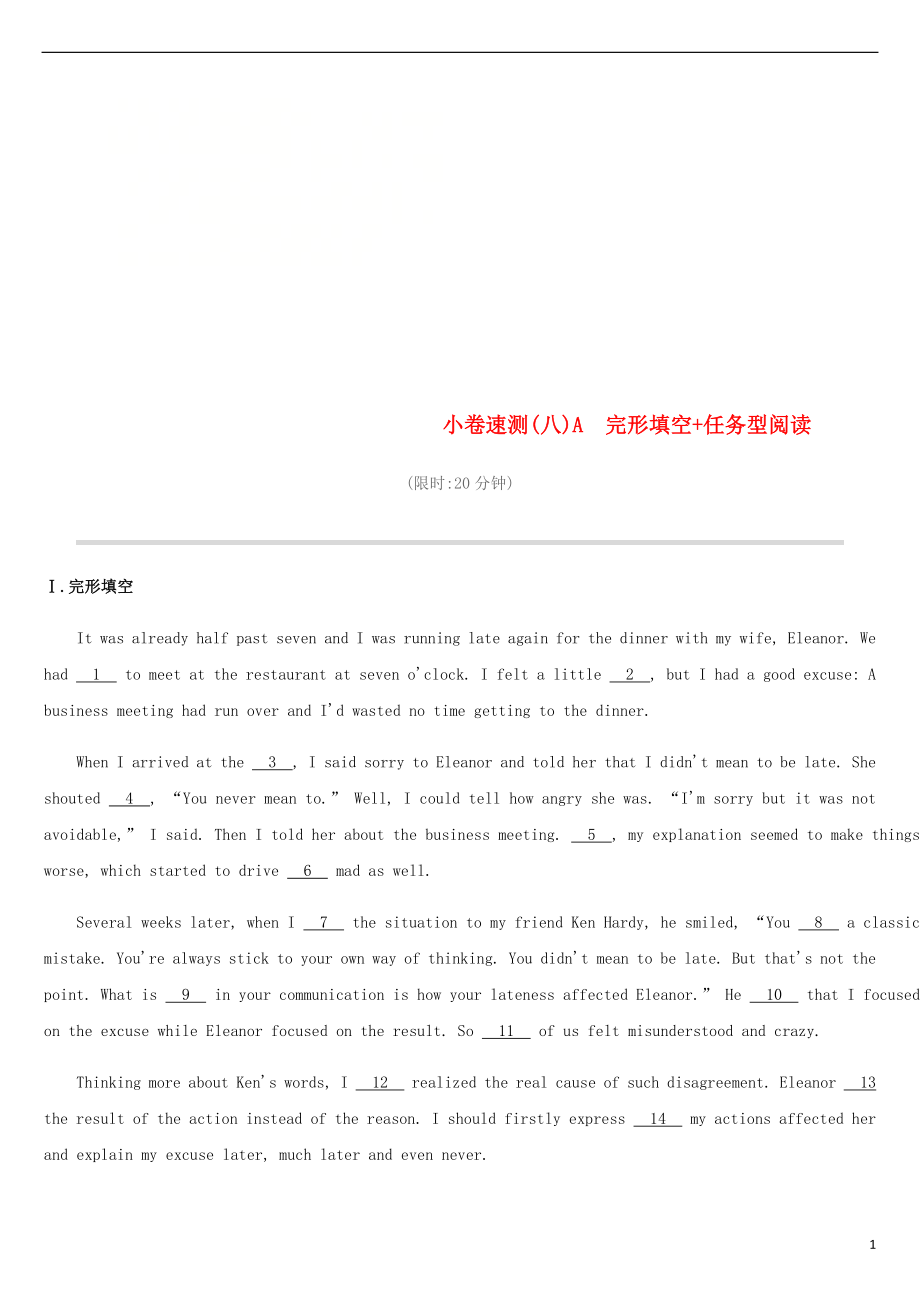《浙江省2019屆中考英語(yǔ)總復(fù)習(xí) 小卷速測(cè)08A 完形填空+任務(wù)型閱讀試題 (新版)外研版》由會(huì)員分享��,可在線閱讀���,更多相關(guān)《浙江省2019屆中考英語(yǔ)總復(fù)習(xí) 小卷速測(cè)08A 完形填空+任務(wù)型閱讀試題 (新版)外研版(5頁(yè)珍藏版)》請(qǐng)?jiān)谘b配圖網(wǎng)上搜索���。
1�、
小卷速測(cè)(八)A 完形填空+任務(wù)型閱讀
(限時(shí):20分鐘)
Ⅰ.完形填空
It was already half past seven and I was running late again for the dinner with my wife, Eleanor. We had 1 to meet at the restaurant at seven o'clock. I felt a little 2 , but I had a good excuse: A business meeting had run over and I'd wasted no time
2���、getting to the dinner.?
When I arrived at the 3 , I said sorry to Eleanor and told her that I didn't mean to be late. She shouted 4 , “You never mean to.” Well, I could tell how angry she was. “I'm sorry but it was not avoidable,” I said. Then I told her about the business meeting. 5 , my explan
3�����、ation seemed to make things worse, which started to drive 6 mad as well.?
Several weeks later, when I 7 the situation to my friend Ken Hardy, he smiled, “You 8 a classic mistake. You're always stick to your own way of thinking. You didn't mean to be late. But that's not the point. What is 9
4��、 in your communication is how your lateness affected Eleanor.” He 10 that I focused on the excuse while Eleanor focused on the result. So 11 of us felt misunderstood and crazy.?
Thinking more about Ken's words, I 12 realized the real cause of such disagreement. Eleanor 13 the result of the
5�����、action instead of the reason. I should firstly express 14 my actions affected her and explain my excuse later, much later and even never.?
Later on, I always talk to my wife and I can really understand her feelings. As a result, I can be 15 time for our dating more often now.?
1. A.started B.
6�、agreed C.continued D.managed
2. A.hungry B.uneasy C.tired D.thirsty
3. A.house B.room C.restaurant D.supermarket
4. A.loudly B.badly C.angrily D.happily
5. A.However B.Therefore C.Moreover D.Otherwise
6. A.her B.him C.me D.them
7. A.spread B.wrote
7���、 C.translated D.described
8. A.knew B.made C.found D.took
9. A.funny B.important C.possible D.simple
10. A.looked out B.brought out C.gave out D.pointed out
11. A.all B.none C.both D.neither
12. A.usually B.never C.hardly D.gradually
13. A.thought about B.tal
8����、ked about
C.cared about D.worried about
14. A.how B.why C.when D.what
15. A.on B.in C.of D.for
Ⅱ.任務(wù)型閱讀
閱讀下面圖表,用表中的相應(yīng)信息完成句子���。
According to the UN, about 1.3 billion tons(噸) of food was lost or wasted in 2015.However, some 795 million people do not have enough food to lead a h
9���、ealthy life. Check the chart below, and find out which region wastes the most food.
16. tons of food was wasted in 2015.?
17. people are still hungry in the world.?
18. wasted the most food in the world.?
19.South and Southeast Asia wasted food in the world.?
2
10、0.The material told us (main idea).?
參考答案
Ⅰ.[主旨大意] 本文是一篇記敘文,主要敘述的是作者和妻子約定吃飯,但作者遲到了,于是作者找借口說(shuō)一個(gè)商務(wù)會(huì)議拖延了時(shí)間,但是這讓事情更加糟糕了���。作者跟他的朋友描述這件事情,朋友幫他分析原因,作者終于找出問(wèn)題的根源所在�����。
1.B 考查動(dòng)詞���。agree to do sth意為“同意做某事”。在此表示夫妻兩人約定晚上在餐廳共進(jìn)晚餐�。
2.B 考查形容詞?�!拔摇奔s會(huì)遲到了,因此心情是有點(diǎn)不安的
11�����、���、憂慮的,所以后文才會(huì)找借口解釋�����。故選B�����。
3.C 考查名詞�����。根據(jù)上文“…meet at the restaurant…”可知選C�����。
4.C 考查副詞�����。根據(jù)下文“Well, I could tell how angry she was.”可知妻子是非常生氣地大吼���。
5.A 考查連詞��?!拔摇备嬖V她開(kāi)會(huì)這個(gè)理由了,然而這讓事情變得更糟糕了��。表示轉(zhuǎn)折用however。
6.C 考查人稱代詞�。由后文as well 可知不僅“我”的妻子生氣了,“我”也很生氣,故選C。
7.D
8.B 考查動(dòng)詞��。make a mistake意為“犯錯(cuò)誤”���。classic意為“典型的”,表示這種錯(cuò)誤的普遍性。
9.B 10.D 11.C 12.D
13.C 考查動(dòng)詞短語(yǔ)�����。句意:Eleanor在乎的是這個(gè)行為的結(jié)果而不是理由����。故選C。
14.A 考查賓語(yǔ)從句的引導(dǎo)詞�����?�!拔摇睉?yīng)該先表達(dá)“我”的行為怎樣影響了Eleanor�����。故選how。
15.A 考查介詞��。on time意為“按時(shí)”���。故選A��。
Ⅱ.16.1.3 billion
17.Some 795 million
18.North America and Oceania
19.the least/about 120 tons of
20.which region wastes the most food
5
 浙江省2019屆中考英語(yǔ)總復(fù)習(xí) 小卷速測(cè)08A 完形填空+任務(wù)型閱讀試題 (新版)外研版
浙江省2019屆中考英語(yǔ)總復(fù)習(xí) 小卷速測(cè)08A 完形填空+任務(wù)型閱讀試題 (新版)外研版

